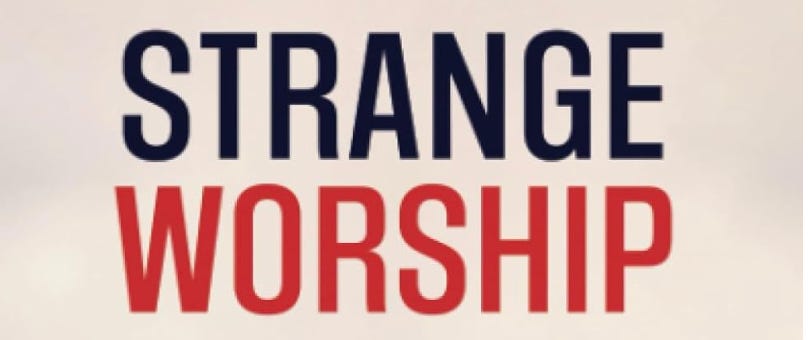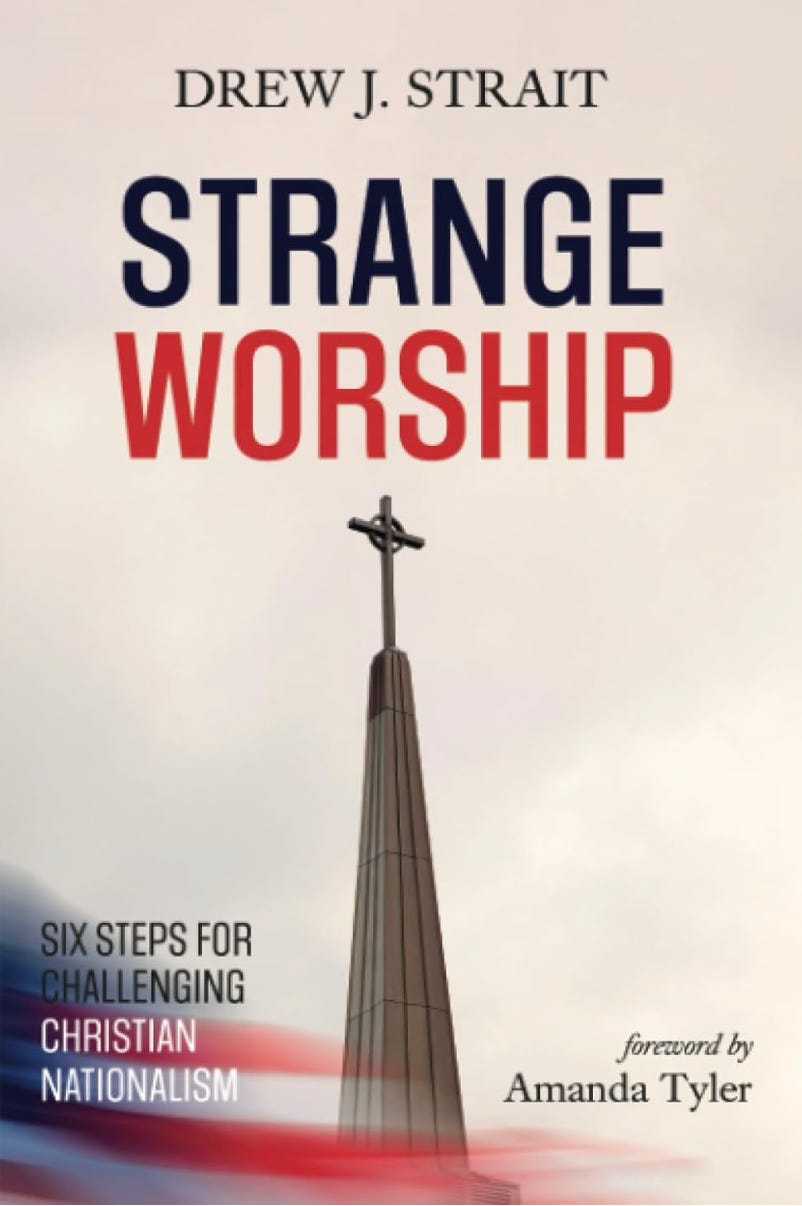
About fifteen years ago someone drew my attention to Christian dominionism in the USA. It was some weird stuff. I admit I thought it was a fad that need not be raised to the level of a serious concern. It is (now) and I was wrong. Christian nationalism (=CN) is a very serious issue. We now have a wonderful new, accessible, practical, and accurate sketch of CN in Drew J. Strait’s book, Strange Worship: Six Steps for Challenging Christian Nationalism.
We can helpfully point at two significant pockets of Christianity in the United States:
Moral therapeutic deism
and Christian Nationalism
CN is not unique to the United States, but the version that appears in America is distinct. As he writes, “Christian complicity and nationalist loyalties that lead to violence is a global problem.” He points at Russia, Brazil, and Ethiopia – each of which has a version of CN.
45% of Americans think the USA ought to be a Christian nation; 60% of adults believe that America’s founders intended to establish a Christian nation. CN folks adhere even more to such beliefs. Dominionism attracted Francis Schaeffer, Loren Cunningham (YWAM), and Bill Bright (Cru). But Lance Wallnau turned the idea of seven spheres of influence for Christians at work in society (with Kuyper-like language) into seven mountains to conquer. Other names would be Matthew Taylor, Che Ahn, Dutch Sheets, and Eric Metaxas. Strait takes us to its most recent version, the New Apostolic Reformation, which “is a loose collection of charismatic churches where dominion theology is growing at alarming rates, and a cabal of prophets and apostles are aligning themselves with right-wing politicians to take dominion over demonic spheres of purported spiritual influence as they anticipate a third great awakening and/or the return of Jesus.” The aim is to take dominion in the USA, not by forcing conversions but by putting non-Christians in their proper place!
I’m with Strait: “the only Christian nation in the world is what the New Testament calls the ekklesia (or, ‘church’) and it is multicultural, borderless, weaponless, and the primary context for bearing witness to the gospel of Jesus Christ.”
The problem is the challenge CN offers: it’s not just an option; it’s what some think Christianity is. Many, like Strait, were discipled into versions of evangelicalism that ended up in the larger circle of Americanism. That is, “God was [during Iraq War] on America's side.” Drew pulled away from Americanistic evangelicalism in those days and found his home among the Mennonites. He learned in those days that “Christian nationalism -- and its soft and hard cultural versions -- is deadly.” Some 200,000 thousand Iraqis died in that war; many Christians saw it as a God’s war against evil.
Long ago Strait wrote a review on this Substack about the important book by Andrew Whitehead and Samuel Perry, called Taking America Back for God. That book “does not contain the latest musings on what a scholar thinks is happening; rather, it comprises a scientific, real-time analysis of what Americans believe in this moment.” For Whitehead and Perry, CN is “a cultural framework -- a collection of myths, traditions, symbols, narratives, and value systems -- that idealizes and advocates a fusion of Christianity with American civic life.” Strait will define this with nuance and concreteness (below). Factors appearing in CN, according to Whitehead and Perry, include “nativism, White supremacy, patriarchy, and heteronormativity, along with divine sanction for authoritarian control and militarism. It is as ethnic and political as it is religious.” True Americans for CN are Christians, and true (American) Christians are CN types. About 50% of Americans lean CN, in various forms, but only 16% of the most ardent of the CN crowd live in cities. CN’s ethics concern power and social hierarchy, which takes us straight into White supremacy, which Strait also discusses (relying wisely on Gorski and Perry). Religion, too, factors in and Strait records this alarming statement: “many churches in the US remain incubators for Christian nationalism.” Not that long ago Kris and I attended a church, and in the prayers for the people the echoes of CN were more than obvious. One person after another chimed in with such a worldview.
Here is Drew Strait’s helpful definition, and I know Strait has been working for a long time on this, so I take this definition seriously:
A movement where one's God-given theological imagination is hijacked by political power.
One’s identity becomes ethno-racial; the context for Christian living is politicized, but in a militarized framework; the ethic perverts the peace ethic and stance of Jesus.
Thus, CN is “strange worship” because it has a “diseased theological imagination that has been hijacked by political power.” I’m glad he brings in sin vs. Sin, with the latter as an agent, a “superorganism” and he cites Matthew Croasmun’s brilliant study, The Emergence of Sin. Strait connects Sin to CN. He’s right. Paul was doing much the same in the 1st Century with “principalities and powers.” Jemar Tisby sees CN as “an ethnocultural ideology that uses Christian symbolism to create a permission structure for the acquisition of political power and social control.”
This is where CN, again, becomes strange religion. In biblical terms, it becomes idolatry. In light of the recent book I wrote with Cody Matchett (Revelation for the Rest of Us), we call it “Babylon.” And, while I’m at it I might as well add to that book the recent book I wrote with Tommy Preson Phillips, Invisible Jesus. A very significant element at work in current deconstructors is the unease and rejection of CN, while attempting to form the Christian faith on a more Jesus-centered foundation.
In brief, then, Strait is making this claim: “It has transformed the nonviolent, enemy and neighbor loving, crucified Jesus into a violent white-Rambo-like god who pacifies human difference through coercion to maintain white power and privilege over marginalized persons” (33). [Over the years I learned not to put page numbers in my constant quotations from books I'm reading for this Substack because I began to see people swiping quotations from me, and that meant they were not looking up the original sources themselves. But I put this page number in so you can quote it anywhere you want.]
Buy this book in lots of a dozen and give them to those who need to read it.

















Scot I am wondering if you are familiar with the podcast series that came out in March of this year entitled, “Charismatic Revival Fury, The New Apostolic Reformation”. I thought this series did a great job outlining NAR’s influence in politics and the Trump administration. This expose overlaps with the NAR’s influence on the January 6th insurgency.
Thank you Scott for sharing this author.